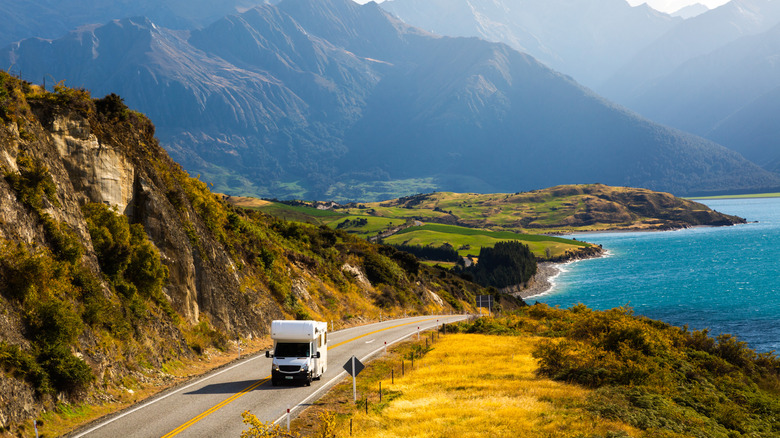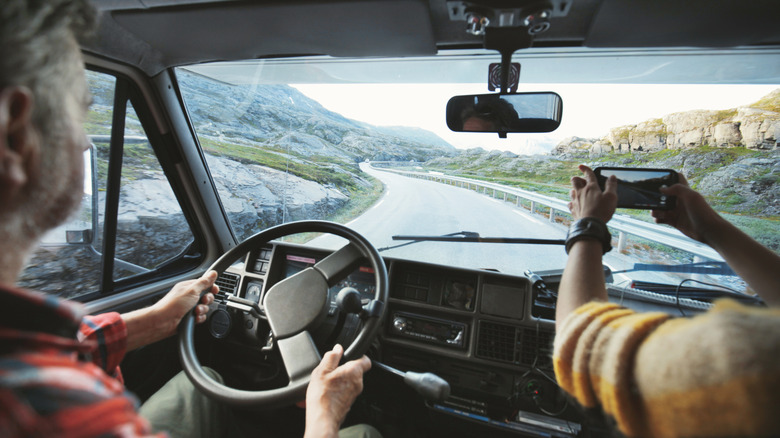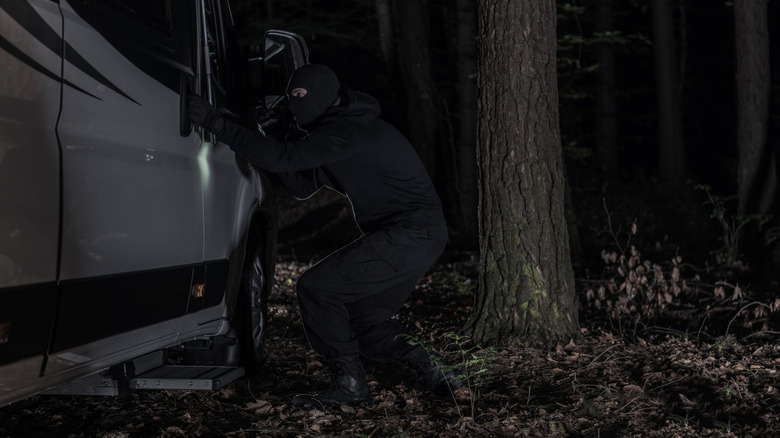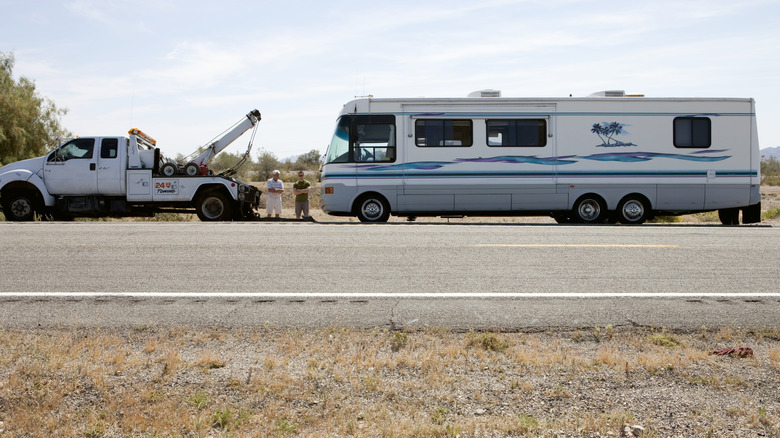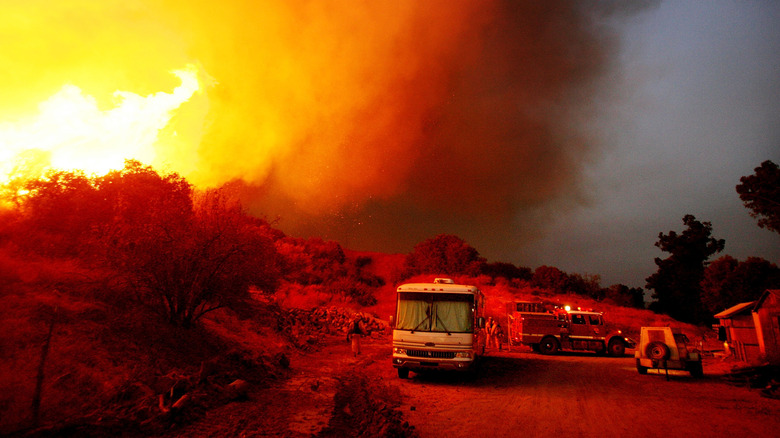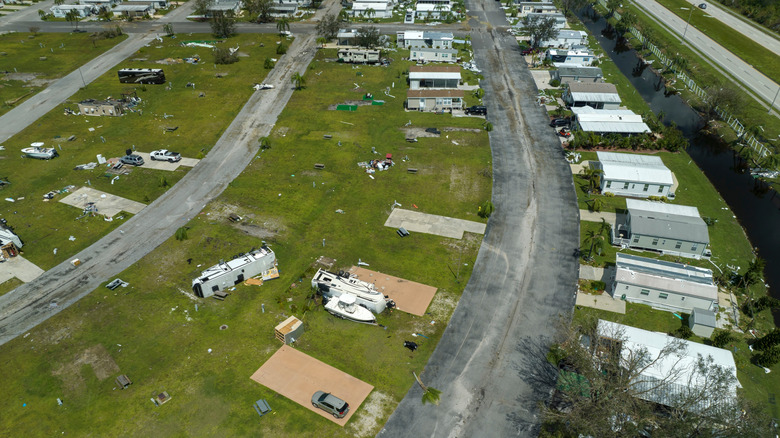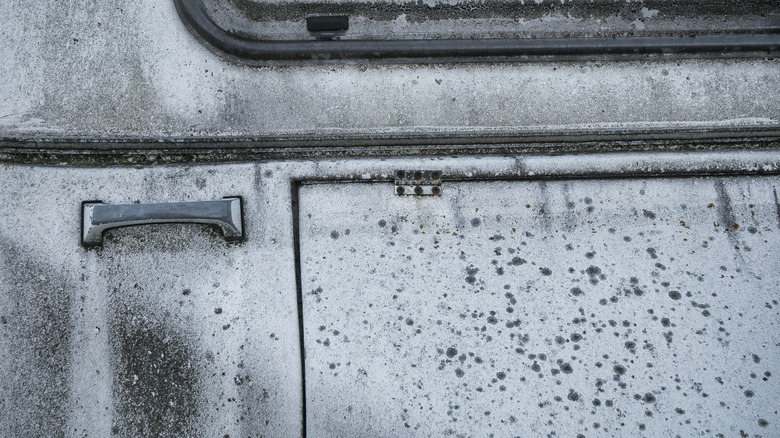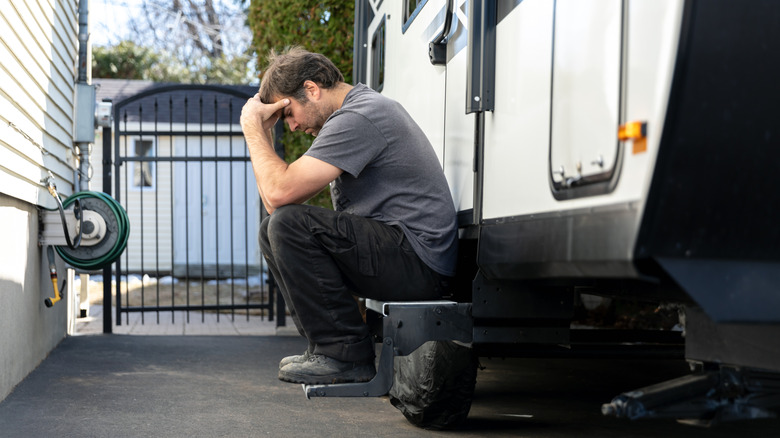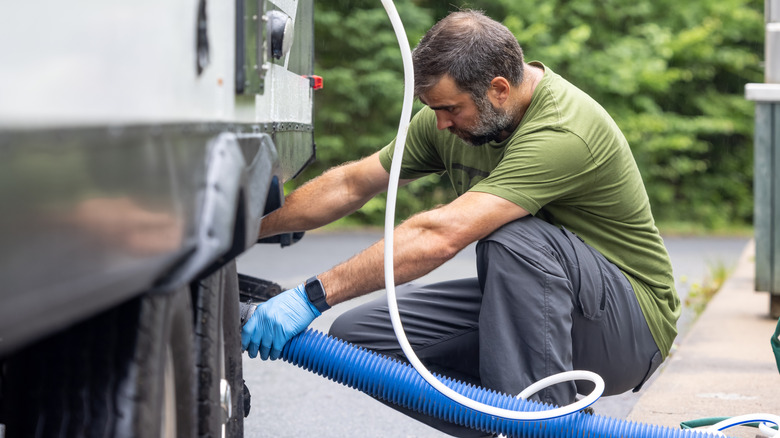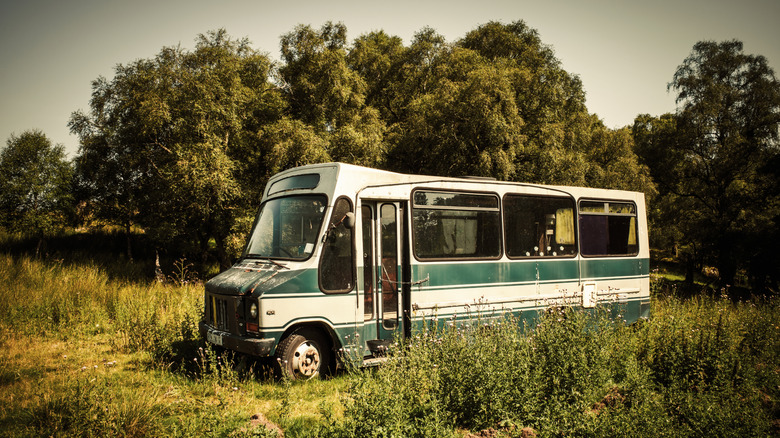Consider These Overlooked Dangers Of RV Living Before Taking Off On The Road
RV living has become increasingly popular, fueled by dreams of freedom, adventure, and simplicity. Social media paints an enticing picture — waking up to mountain views, cooking meals in cozy spaces, and chasing sunsets down endless highways. It's easy to see why so many are drawn to this lifestyle.
But before you sell your belongings, pack your bags, and hit the road, it's important to step back and ask: Am I ready for what RV living truly entails? While the idea of life on the road is undeniably exciting, the reality often includes challenges that are overlooked in glossy Instagram posts that only highlight the perfect campsite adventures.
RV living isn't just about stunning landscapes and newfound freedom. It's also about being able to navigate unexpected dangers and logistical hurdles. From mechanical breakdowns in the middle of nowhere to steep repair costs, from dealing with unpredictable weather to managing limited resources like water and electricity, the RV lifestyle demands a level of preparation and resilience that many underestimate. These realities don't mean you shouldn't embrace the RV lifestyle, but they do prompt you to be fully informed before diving in. So, consider these overlooked dangers of RV living before taking off on the road.
Hidden costs can derail your RV dreams
When you imagine RV living, your mind might drift to scenic road trips and cozy nights under the stars. But what often gets overlooked are the significant hidden costs associated with RV ownership and living. At first glance, an RV may seem like a cost-effective way to travel or live, especially since it's possible to park your RV overnight for free in many places, but other expenses can quickly add up.
Insurance for an RV is generally more expensive than standard car insurance, especially for larger models or those with high-end features. Maintenance is another ongoing expense — regular servicing, tire replacements, and seasonal upkeep can strain your budget. Finding a safe place to store your RV when it's not in use can also be costly, especially in urban areas. Beyond these predictable expenses, unexpected repairs often blindside new RV owners. Whether it's a broken water pump, a malfunctioning generator, or damage from a storm, these repairs can cost thousands of dollars and disrupt your plans, like Youtubers Broken Dreams Reborn have experienced continually while on the road.
Then, there are campground fees, which can range widely depending on location and amenities. Popular spots during peak seasons can cost as much as a hotel stay, making this affordable lifestyle unattainable. The hidden costs of RV living can threaten your financial stability and undermine the freedom you seek with RV living. Without careful planning, these expenses can lead to stress and even debt. This is why it's important to consider these costs upfront and build a financial cushion to navigate the risks and enjoy the open road with financial confidence.
RV driving is more difficult than you may assume
Driving an RV is not the same as driving a standard car or SUV. The size, weight, and design of these vehicles create unique challenges and risks that new RV owners often underestimate, often jumping into the driver's seat without much thought. The most significant risk is accidents, which often result from inexperience, poor visibility, or failure to understand the vehicle's limits. Driving an RV requires additional skills and aptitude, like accounting for longer braking distances, wider turns, and the additional height of the vehicle.
Clearance issues are a common hazard when driving an RV. New drivers often don't realize the extent to which RVs exceed the height of standard vehicles, making low overpasses, bridges, and even tree branches potential obstacles. Misjudging clearance can result in costly damage and put you and others on the road in dangerous situations. Awareness and preparation are critical to avoid such mishaps.
Another commonly overlooked driving risk involves unsecured items within the RV. Since your vehicle doubles as your home, it can be easy to forget that loose items will move around in transit. Poorly secured belongings can become projectiles in sudden stops or sharp turns, endangering passengers or causing interior damage.
Safety begins with preparation. New drivers should consider taking an RV driving course to learn the basics, such as how to back up, navigate tight spaces, and handle emergencies. Regular vehicle inspections and securing interior items before hitting the road are essential for a safer, smoother journey.
RVs come with greater security risks than traditional homes
While RV living offers freedom and adventure, it also comes with unique security challenges that aren't always immediately apparent. Unlike traditional homes, RVs are more vulnerable to theft or vandalism. Their mobility makes them a target for opportunistic criminals, particularly when parked in less secure areas.
Many RVs, especially older models or DIY conversions, lack advanced security features. Basic door locks are often easy to bypass, and large windows provide visibility into your belongings. This is particularly concerning for those who travel with expensive equipment, such as cameras or laptops.
Storage security is another factor to consider. When your RV isn't in use, leaving it in an unsecured lot or driveway increases the risk of vandalism or break-ins. Investing in a secure storage location can mitigate this risk but adds another expense.
To enhance security, RV owners should consider several precautions. Upgrading locks and installing an alarm system can deter potential thieves. Motion-activated lights and security cameras can also provide peace of mind. Simple steps like using a steering wheel lock, keeping valuables out of sight, and parking in well-lit, populated areas can reduce risks. Ultimately, the freedom of RV living comes with the responsibility of protecting your home on wheels. Taking proactive measures to secure your RV ensures your journey won't be derailed.
Are you prepared to handle an emergency or breakdown?
RV living by nature is adventurous, and emergencies and breakdowns are almost an inevitable part of life on the road. The question is: Are you prepared to deal with them? Unlike a traditional home, an RV comes with unique risks, and being unprepared can turn a minor inconvenience into a major disaster.
Breakdowns are not uncommon challenges in RV life. A flat tire, a failed engine, or even a dead battery can leave you stranded in remote locations, far from help. Without the right tools or a roadside assistance plan, you may face long delays and steep repair costs. The isolation of certain locations amplifies these risks, leaving you vulnerable without immediate access to help or supplies. Imagine losing a tire and cell signal in the middle of nowhere — these situations can become dangerous if not addressed effectively.
Having essential supplies is critical to avoid such disasters. A well-stocked emergency kit, including first aid items, extra food and water, flashlights, blankets, and a toolkit, can make all the difference. Investing in portable power sources, communication devices, and a reliable GPS ensures you're prepared for the unexpected. These small steps, taken in advance, can help you navigate challenges confidently, keeping your adventure on track.
Fires can spread quickly in an RV
In the event of a fire, we often forget that RVs, even though they seem like traditional homes, are not like them. They are designed to be compact and made from lightweight, combustible materials, which are prime for fire spread. This makes it essential for RV owners to understand fire risks and take preventative measures to protect themselves and their property.
Common causes of RV fires include electrical issues, cooking accidents, and malfunctioning propane systems. Faulty wiring, overloaded circuits, or aging components can ignite fires that spread before you even realize an issue. Propane, used for heating and cooking in many RVs, is another potential hazard. A leak or malfunction in the system can lead to a dangerous explosion.
FEMA reports that RV fires can engulf the vehicle in minutes, leaving little time to react. This highlights the importance of having fire safety measures in place. Regular maintenance of electrical and gas systems can prevent many common problems. Knowing how to exit your RV quickly during a fire is vital. Practicing evacuation drills with your travel companions and learning to alert people around you during a fire can save lives.
Additionally, parking your RV with safety in mind — away from fire hazards and ensuring clear access for emergency vehicles — adds a layer of protection. Fire is a danger, but preparation can significantly reduce the risk. Taking proactive steps ensures your RV adventure doesn't end in tragedy.
Extreme weather poses serious risks for mobile RVs
The allure of RVs is that they are mobile; they allow you to pick up, pack up, and move anywhere, anytime. However, this same design makes them vulnerable to extreme weather conditions. RVs lack the structural integrity that traditional homes have to withstand severe storms, high winds, or extreme temperatures, putting your safety and comfort at risk.
RVs are especially at risk during hurricanes and tornadoes. Their lightweight build and elevated center of gravity make them prone to overturning or being damaged by flying debris. Flooding is another hazard, as RVs are often parked in low-lying areas or near bodies of water. Even less severe weather, such as heavy rain or hail, can cause dents, leaks, and long-term structural damage.
Temperature control is also a noteworthy challenge. You can keep your RV warm on chilly nights by making simple additions. But generally, RVs lack robust insulation and climate control systems, making it difficult to maintain comfortable indoor temperatures during heat waves or freezing conditions.
To mitigate these risks, preparation is key. Monitoring weather forecasts and planning travel routes around potential hazards can help avoid dangerous situations. Use weather guides and travel tips to inform yourself about storm seasons in the various areas you plan to visit. Additionally, having an emergency evacuation plan and knowing the locations of nearby shelters or safe zones can be crucial to saving you and your loved ones' lives.
Humidity and mold pose serious risks for RV living
Living in an RV exposes you to mold, a unique and often underestimated danger. Mold is often caused by unchecked humidity. RVs are more prone to moisture buildup because of their compact size and reduced airflow. The presence of these microscopic organisms can quickly escalate into a health concern and structural problem if not addressed.
Humidity inside an RV is often unavoidable — cooking and showering generate moisture in such a confined space. Another common culprit? Hanging clothes to dry inside the unit. These activities trap moisture in the confined space. When humidity levels remain high consistently, mold growth can take hold within days, spreading on walls, ceilings, and under flooring — areas that often go unnoticed until the damage is severe.
Structural damage from mold can weaken the integrity of your RV over time, leading to costly repairs. In some cases, the infestation becomes so severe that the entire unit needs professional remediation or replacement. Additionally, condensation on windows, water leaks, or insufficient ventilation exacerbates the problem, making it harder to control.
But mold doesn't just damage your RV; it poses health risks, particularly for those with allergies, asthma, or other respiratory conditions. Given how quickly mold can develop and how challenging it can be to eradicate once it takes hold, it's essential to mitigate and prevent it in the first place. RV owners should actively manage humidity, opening doors and windows while showering or cooking to ensure proper ventilation. Using dehumidifiers is also great.
Pests can also wreak havoc on your RV and health
Living in an RV brings you closer to nature and increases your exposure to critters. Ants, spiders, mice, and other pests can infiltrate your space with surprising ease, creating not only a nuisance but also a significant risk to your health and the integrity of your RV.
Pests often enter through tiny gaps, vents, or poorly sealed doors and windows. Once inside, they can multiply quickly. Rodents like mice and rats are especially dangerous, as they chew through wiring, insulation, and storage, leading to costly damage and potential fire hazards. They also carry diseases such as Hantavirus, which can pose severe health risks to humans.
Insects, too, can become a serious problem. Ant infestations, for example, are notoriously hard to control once established. Cockroaches and other bugs can contaminate food supplies and worsen allergies. The confined space of an RV makes it even more challenging to eliminate pests once they've taken up residence. The danger lies in the inconvenience, long-term damage, and health risks that pests can cause. Preventative measures are essential, such as sealing entry points, keeping RV floors clean, storing food in airtight containers, and using natural repellents.
RV living can put a strain on your mental and physical health
RV living has many appealing aspects, but its reality is not always so idyllic. It often involves long hours of driving, which can lead to back pain, fatigue, or circulation problems if your routes don't allow stops for stretching and moving. Add the challenge of preparing nutritious meals in a cramped kitchen, and poor dietary habits can develop. Combined, this is a recipe for disaster for your physical health.
Healthcare access is another pressing concern. Remote locations, often sought for their beauty and solitude, typically lack nearby medical facilities. Living in a confined space can also be taxing, especially if traveling with others. The lack of personal space, even in the most luxurious vehicles, combined with the constant need to plan routes, manage repairs, and navigate unfamiliar terrain, can lead to heightened frustrations and stress. For those prone to anxiety or depression, the unpredictability of RV life can exacerbate these conditions, making it harder to manage mental health.
It is possible to avoid and mitigate these issues with open and transparent communication, but the danger lies in how these health challenges can accumulate over time if unaddressed. If conflicts are not resolved and tensions linger, or if you don't give yourself time to exercise or eat properly, the dream of RV living can turn into a source of chronic stress. To protect your health and have a stress-free road trip, it's vital to prioritize self-care, establish routines, and build an understanding of mutual needs in groups. It's also a good idea to research nearby medical facilities before traveling to remote locations.
Improper waste management can turn RV living into a health and safety hazard
Managing waste and maintaining a reliable water supply are vital aspects of RV living that, if neglected, can pose serious health and safety dangers. RVs have limited-capacity waste tanks and water systems, requiring constant monitoring and maintenance.
RVs typically have separate tanks for gray, black, and fresh water. Managing these systems improperly can lead to leaks, contamination, or foul odors. Gray water, which comes from sinks and showers, and black water, which contains sewage, must be dumped at approved facilities. While these facilities are generally available near campgrounds, their accessibility can vary, especially in remote areas or during peak seasons. On top of that, some RVers ignore proper disposal regulations, posing environmental and health risks for others.
Limited water storage adds another layer of difficulty. Fresh water tanks run dry quickly, especially in hot climates or during extended trips. Conserving water is essential, but running out of it entirely can leave you unable to hydrate, maintain hygiene, or prepare meals. This can be especially dangerous if you're far from a resupply point. The danger here is twofold: mishandled waste can harm the environment and your health, while insufficient water supplies can leave you stranded and vulnerable.
Environmental damage is an overlooked consequence of RV living
The freedom of the open road comes with a hidden cost: the environmental impact of RV living. Though it might seem (and can be, when done mindfully) like an eco-friendly alternative to traditional housing, the reality is more complex, and the consequences can be far-reaching if left unchecked.
RVs rely heavily on fuel, with larger models consuming significantly more gas or diesel than standard vehicles. The high fuel consumption contributes to greenhouse gas emissions, making frequent travel a less sustainable choice. But it's not just gas that you use for travel. Energy costs are also involved when you park to shower, clean, or use electricity.
In areas where RVs tend to gather — popular national parks, forests, and campgrounds — overcrowding can lead to soil erosion, wildlife disruption, and litter. The strain on natural ecosystems from an influx of visitors can degrade the very landscapes RVers often seek to enjoy. "Boondocking" or off-grid camping can leave long-term environmental scars if waste disposal is mishandled. Proper disposal of trash and wastewater is essential, yet many backcountry locations lack the infrastructure to handle the volume of waste generated by RVers.
It's not just one RV that creates damage. The cumulative effect of these environmental pressures could result in restricted access to natural sites and long-term harm to ecosystems. Of course, RV living isn't meant to, nor does it have to be, synonymous with environmental degradation. Using fuel-efficient plans, adhering to Leave No Trace principles, and choosing eco-friendly camping gear are small steps that can make a big difference.
